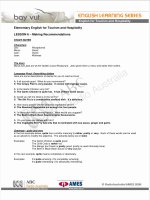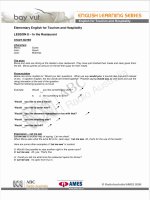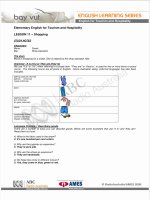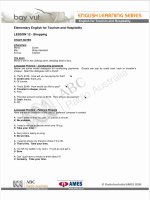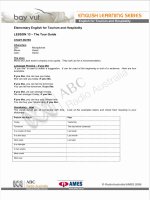English for Today Classes 9-10
Bạn đang xem bản rút gọn của tài liệu. Xem và tải ngay bản đầy đủ của tài liệu tại đây (8.25 MB, 234 trang )
Prescribed by the National Curriculm & Textbook Board
as a Textbook from the academic session 2013
ENGLISH FOR TODAY
Classes 9-10
Writers
Raihana Shams
Md. Zulfeqar Haider
Goutam Roy
Surajit Roy Majumder
Md Abdur Razzaque
Naina Shahzadi
Editor
M S Hoque
NATIONAL CURRICULUM & TEXTBOOK BOARD, DHAKA
Published by
National Curriculum & Textbook Board
69-70, Motijheel Commercial Area, Dhaka
[All rights reserved by the publisher]
Trial Edition
First Publication : October 2012
Text Developement Coordinator
Mohammad Humayun Kabir
Computer Compose
Laser Scan Ltd.
Cover
Sudarshan Bachar
Sujaul Abedeen
Illustrations
Prohlad Karmaker
Design
National Curriculum & Textbook Board
For Free Distribution for academic year 2010 by the Government of Bangladesh.
Printed by :
Preface
The secondary curriculum has been revised in the light of National Education Policy
2010, which emphasises learning English as an intarntional language for
communicating locally and globally. The English For Today textbooks have been
developed to help students attain competency in all four language skills, i.e. listening,
speaking, reading and writing.
The development of curriculum, syllabus and textbook is a continuous process. In
continuation of it, this book has been developed and rationally evaluated by a group
of experts, which included curriculum specialists, subject specialists, teacher trainers
and classroom teachers. The contents and illustrations of this book have been
developed in order to suit the learners' age and cognitive level. The book emphasises
practising language skills through a variety of meaningful and enjoyable activities.
The p
ublication of teacher's guide is under process. The teacher's guide will help
teachers
plan lessons more effectively and teach students communicatively through
teaching learning activities.
My h
eartfelt gratitude goes to the curriculum developers, writers, illustrators and
coordinator
who worked under tremendous time constraints. Without their sincerity,
commitment and hard work, it would not have been possible for NCTB to develop the
English textbook 'English For Today', making it available to teachers and students all
over the country by January 2013. As the textbook was developed within a very
limited time, there is room for further development. Attempts have been made to
make the book free from errors as far as possible. Any constructive suggestions for
the improvement of the textbook will be welcomed and incorporated in future
editions.
I a
lso sincerely thank all involved in the production and publication of this textbook.
If
this book is used properly, it will no doubt facilitate learning English at the desired
level.
Prof. Md. Mostafa Kamaluddin
Chairman
National Curriculum & Textbook Board
Dhaka
Content
Unit Title Page No.
Unit One Good citizens 1
Unit Two Pastime 15
Unit Three Events and festivals 32
Unit Four
Are we aware? 47
Unit five
Climate change 65
Unit Six
Our neighbours 81
Unit Seven
People who stand out 103
Unit Eight
World heritage 124
Unit Nine
Unconventional jobs 136
Unit Ten
Dreams 146
Unit Eleven
Renewable energy 157
Unit Twelve
Roots 171
Unit Thirteen
Media and e-communications 186
Unit Fourteen
Pleasure and purpose 198
Unit One
Good citizens
Learning outcomes
After we have studied the unit, we will be able to
x narrate incidents.
x participate in discussions.
x listen and understand others.
x describe something in writing.
English For Today 2
Lesson 1: Can you live alone?
A Look at the pictures and discuss in pairs the following questions.
1 Can you live alone in a house?
2 Make a list of the problems you think you will have if you live alone in a
house, e.g. having accidents, cooking, etc.
Picture 1 Picture 2
B Read the story and answer the questions that follow.
Long ago, a young man found life in the family in his village full of problems and
sufferings. Quarrels, ill-feelings, jealously, enmity - all were part of everyday life
there.
So he left his house and went to a jungle to live by himself. There he made a nice
little hut with wood, bamboo and reeds. “Ah, how happy I am here!” said the man to
himself.
But one day he found some mice in his hut. The little creatures soon made holes in
his blanket. So he brought a cat to kill the mice. The cat needed milk. So he brought a
cow. The cow needed grass and hay. So he brought a cowboy.
English For Today 3
The cowboy needed food. So he took a wife to cook meals. Then children were born
to them, and the man found himself again in a family.
So nobody can live alone, unless they are either angels or devils. People need food,
shelter, companions and cooperation. They need to help each other. And if they live
in a family or community, their need can be fulfilled. Hence living in society can
make people good and happy citizens.
C (Books shut) What five things did the young man do in the jungle? Now
divide into groups of five. Tell the story to the groups sequentially.
D Answer these questions. First discuss in pairs, then write the answers
individually.
1 Why did the young man leave his house?
2 Where did he make a hut? What did he make the hut with?
3 Was the man happy in his hut?
4 How did he find himself again in a family?
5 Where and how can a person be happy?
6 What is the moral of the story?
E Look at the pictures (a j). Read the following texts (1 10) and match
the pictures with the texts. Write the numbers of the texts next to a, b, c,
etc. The first one is done for you.
4 English For Today
a … ……. b ………….
c ………… d ………….
e ………… f …………
g …………. h ………….
i …………… j …………
English For Today 5
1 As people live in a community or society, they often have problems. A
family may have a problem with a particular member (a son / daughter) who
keeps bad company. So they discuss to solve the problem.
2 To prevent theft or robberies, constant security measures are often
necessary within the village / city area.
3 A community may have a problem like they don’t have a primary school in
the village or locality. So the people need to discuss the issue in a meeting
and find out how to set up a school for their children.
4 Cooking should not be exclusively a woman’s job.
5 Young learners must cultivate virtues and acquire knowledge and skills to
prepare themselves to carry out their roles as good citizens. So they need to
study formally in the institutions.
6 To establish peace and harmony among the people in a locality / village,
often experienced, elderly people mediate between quarrelling people.
7 Only studying at school is not enough for the young learners. They must
also acquire knowledge and skills at home as well as from media, clubs,
sports, libraries and so on.
8 The people in a society / locality often need to buy things at home. So
there are vendors selling necessary things.
9 In a village or locality often roads need reservicing for easy movement of
people and transport.
10 Side by side with acquiring knowledge and skills, the youths must cultivate
good qualities like having genuine sympathy for the weak and the poor,
helping the needy, showing respect for others and having a strong sense of
dignity of work.
F Discuss in pairs and write an answer to this question:
What can we do at home and in the locality to become good citizens?
6 English For Today
Lesson 2: Knowledge, skills and attitudes
A Discuss in groups this question:
What do you need in addition to food, shelter, company, etc. to become a
good citizen?
B Read the text.
To be a good citizen, you have to prepare yourself to do good work in society. Well,
then how can you prepare yourself?
First, you need knowledge. Today’s society is knowledge-based. Without knowing
modern sciences, technologies including ICT and other necessary subjects, you will
have difficulty living a good life. The other areas you, as a good citizen, should have
knowledge about are:
x our country, its constitution, geography and people
x our state, its executive and legislative powers
x our judicial system
x our government and its structures and functions
x our history, cultures, traditions, literature, moral values and religions
x our socio-economic activities and educational system
Second, you need skills to do things. Knowledge is not enough. You must be able to
apply your knowledge to do things practically.
Finally, knowing and doing things will bring about a change in your behaviour
towards others. This behavioural change will show your attitudes towards others, that
is, it will show how you think and feel about a person or thing.
English For Today 7
Let’s take an example. Suppose you, as a student, need to know about ‘group work’
in the classroom. So you ask yourself or your teacher or anybody, “What is group
work?” Or you may find about it in a book. In this way, you can know, or you may
have the knowledge, about group work: To do group work, the class has to be
divided into groups. Each group is to do some tasks given by the teacher or in the
textbook. The group members will discuss and share ideas and points, and finally one
member will write the answer. All this is knowledge about group work.
Then you start working in groups. In each group you take turns discussing points,
answering questions, etc. In this way you actually do the task. Your teacher may
monitor and help you to do the work.
Lastly, through regular group work it is expected that there will be noticeable
changes in your behaviour. Possible changes are:
x You will develop the attitude of freely mixing and talking with your
classmates and teacher.
x Your shyness will gradually disappear.
x You will develop the attitude of helping and cooperating with each
other.
x You will learn to behave in a democratic way.
Most importantly, these behavioural changes taking place in you inside the classroom
will be carried over outside the classroom, in real-life situations.
C Read the text below. Then discuss with your partner and write K (if the
text is knowledge based) or S (if the text is skill based) or A (if the text
refers to attitude) against each text.
1 Abraham Lincoln, a former president of the United States, advocates a
“Government of the people, by the people, and for the people.” This means
that the people have the right to control their government.
8 English For Today
2 Two students are making a kite with coloured paper, sticks, glue and
string.
3 Tisha’s room was always messy. She could not find things easily. Recently
she has visited her cousin Ritu in Chittagong. She saw that Ritu’s room
was very neat and tidy. Everything was exactly in its place. Ritu instantly
finds what she wants. After getting back home, Tisha spent a whole
weekend making her room well organised.
4 “It is the duty of every citizen to observe the constitution and laws to
maintain discipline, to perform public duties and to protect public
properties.” (The Constitution of The People’s Republic of Bangladesh)
5 Students in pairs are acting out a dialogue in a class.
6 Mouli is back from school. She is very hungry and looks exhausted.
“What’s wrong, Mouli?” asks her mother anxiously. “Don’t worry, Mom.
I’m OK. I just didn’t have my tiffin today.” “But why?” “Our peon died
this morning. With other students I gave my tiffin money to the widow.”
7 The students of physical education class are practising stretching exercise
in the school yard.
8 The affairs of Dhaka city were run by the Dhaka Municipality until 1978,
when the city came under the Dhaka City Corporation.
D Discuss in groups. Write how K S A can be shown in the following topics:
Orsaline Debate E-mail
English For Today 9
Lesson 3: Good character
A Ask and answer these questions in pairs.
1 What do you understand by character?
2 What does a person with a good character usually do to others?
B Listen to the teacher / CD and answer the following questions.
Questions: Tick the best answer.
1 Which is the correct statement according to the information in the listening
text?
a Good character does not mean special qualities.
b Good citizens must have good character with other things.
c Character means a tool to curve wood.
d Character traits are distinctive marks always seen on a person’s face.
[
2 The red crest of a rooster
a is a symbol of power and strength.
b enables it to crow in the morning.
c makes the bird tall and beautiful.
d shows how it is different from a hen.
3 The expression ‘distinctive qualities’ means those qualities of a person, which
a are the same as others’.
b emphasise honesty in him/ her.
c make him / her different from others.
d he / she gets from their parents.
Listeningtext1
10 English For Today
4 Character traits are
a naturally gifted.
b personally learned.
c God given.
d physically visible.
C Fill in the blanks in the following passage with appropriate words from
the box.
Citizens having good character live a life of virtue. They may belong to any social
1)_____________, upper or lower. Their thoughts and 2)_______________ show
high moral values. That is, they have a strong 3)____________ of right and wrong.
So what they do is 4)_____________ for themselves as well as for others in the
5)____________ and in the society. In fact, they cannot even think of
6)____________ any wrong to others. One of the most positive 7) _____________
of these people is tolerance towards 8)___________. Suppose a group of people in
your community 9)_____________ or practice in something which you do not like
10) _____________. But as a good citizen you should 11) ____________ them to
perform their activities. Thus tolerance can generate 12) _______ for people of other
cultures. Tolerance and respect together can make life 13) _____________ and
peaceful in society.
D Read the completed passage and tick the best answer.
1 People with moral values
a can do anything they like.
b belong to upper social class.
c do good only for themselves.
d cannot do anything wrong to others.
harmonious allow behaviour respect good doing family
class others sense qualities believe personally
English For Today 11
2 ‘Tolerance’ means
a allowing others to say and do as they like.
b a quality of Buddhists.
c having disagreements with others.
d a quality that every citizen has.
3 What can make life harmonious in society?
a performing religious rites
b encouraging cultural values
c respecting others’ beliefs and opinions
d fulfilling religious obligations
E Find the opposites of these words. If you do not know any, look it up in
your dictionary. Then make a meaningful sentence with each of these
opposites:
right wrong
If you have moral values, you cannot do any wrong to your fellow beings.
tolerance
respect
allow
enjoyable
F Write a paragraph about how tolerant or intolerant you are
towards your classmates. Give examples.
12 English For Today
Lesson 4: Responsibilities
A Read the situation.
Rony’s mother gave him 50 taka to buy salt and chillies. On his way to the market,
Rony found a poor passer-by trying to hold a boy up, who was lying on the road,
groaning. Coming near, Rony saw that it was his classmate Tanim, who was hit by a
speeding motorbike. Immediately he called a baby taxi and took Tanim to a clinic.
From there he phoned Tanim’s parents. When they came to the clinic, Rony returned
home without salt and chillies. He paid the money to the taxi driver.
Now discuss in groups the following questions.
1 Did Rony do right or wrong? Why ?
2 What do you think his mother will do when Rony comes back home
without salt and chillies?
3 What do you mean by responsibility?
B Read the text and answer the following question:
What is responsibility?
A responsibility is a duty or an obligation TO DO something. For example, you have
the responsibility to take care of your parents in their old age, to attend school and
pursue your studies properly and so on. You have also the responsibility to society
and the government, e.g. to help a neighbour in trouble or to cast your vote if you are
18 or over.
A responsibility is also an obligation or a duty NOT TO DO something. For example,
you have the responsibility not to steal a book from a public library or not to put your
building materials on the footpath. These are your responsibilities as citizens. But
English For Today 13
there are responsibilities of the government as well. Our government has the
responsibilities to provide for its citizens “the basic necessities of life, including food,
clothing, shelter, education and medical care”
1
. The government also has the
responsibilities to protect the fundamental rights of its citizens to freedom of speech
and expression, freedom of the press, freedom of religion, equality of all before law
2
etc.
The knowledge, skills and attitudes you have gained at home, at school and in society
will help you to accept your responsibilities and to carry them out effectively.
Remember, discharging your responsibilities will be good for you, good for your
family and friends, and good for your society and country as a whole.
Notes
1 The constitution of the People’s Republic of Bangladesh, Part II.
2
Part III, ibid. (Ibid:. abbreviation from Latin ibidem which means in the same book or piece of
writing as the one that has just been mentioned above.)
C Discuss in groups and write answers to these questions.
1 Where or who can you get your responsibilities from? Make a list. The first
one is done for you.
a. parents
b. ………
c. … …
2 Make a list of responsibilities as students you have at home, school, and in
society.
3 Make another list of things you shouldn’t do at home, school, and in society.
4 Who do you get help from to discharge the responsibilities you have listed in
C1? How do they help you?
5 Are there any difficulties in fulfilling the responsibilities? Briefly describe
them.
14 English For Today
6 Make a list of responsibilities other people have towards you. Briefly describe
what might happen if they fail to fulfil the responsibilities.
7 (a) What rewards you are likely to have if you fulfil your responsibilities?
(b) What penalties or punishments you may get, if you do not discharge
them?
8 What responsibilities do you think you can discharge well when you go on a
class picnic or when your school puts on a play as part of its annual prize-
giving programme?
D Look at the picture. Work in pairs.
Suppose this road is near your school. As students of this school, what
responsibilities do you think you have to get rid of this nuisance? Make a list on how
you will discharge the responsibilities?
English For Today 15
Unit Two
Pastimes
Learning outcomes
After we have studied the unit, we will be able to
x narrate incidents and events in a logical sequence.
x participate in conversation, discussions and debates.
x read maps, charts, graphs etc.
16 English For Today
Lesson 1: Have you any favourite pastime?
A Look at the pictures. What are the people doing here? When do people do
these kinds of work?
B Listen to the dialogue and answer the questions.
Tiya : Anusha, what happens? You’ve sports trousers, T-shirts, sports shoes,
and a carry bag! Where are you coming from? And you look tired!
Anusha : Not exactly, Tiya. I’m great because I’m just from the gym.
Tiya : Do you go to the gym regularly?
Anusha : Almost yes. I go twice a week. It’s one of my favourite pastimes.
Tiya : Really! Going to the gym is your favourite pastime! You make me
laugh!
Anusha : Why not? I like sports because I like to keep in shape. I’m not a lazy
person like you!
Tiya : What do you do there?
Anusha : I do yoga.
Tiya : Don’t you have any other pastimes?
English For Today 17
Anusha : Hmm…yes, I have. I like playing chess, painting, and reading books
when I’m free. I also like photography but I’m yet to learn it. What do
you do for pastime?
Tiya : I like watching TV, listening to music, reading books and
magazines, and playing games on the computer. I do like gardening.
But we don’t have sufficient space. So I do pot planting. By the way,
I don’t know much about yoga. Would you please tell me about it?
Anusha : Sure! I’ll give an article on it. It will help you know about it. Okay?
Questions
1 Why does Anusha like going to the gym
2 What are her pastimes?
3 Make a list of Tiya’s pastimes.
4 How will Tiya learn about yoga?
C Read the following texts. Then check (¥) the statements below:
Yoga: Tap into the many health benefits
Suppose your kids are demanding the latest video game, your boss wants that report
done today by five, and your partner wants to know what's for dinner tonight. Stress
and anxiety are everywhere. In this situation, to keep fit as well as to give them the
best you need to do something. And here comes yoga to help you.
Understanding yoga
Yoga is a kind of posture and breathing exercises. It brings together physical and
mental disciplines to achieve peace of body and mind, helping you relax and manage
stress and anxiety. Traditional yoga puts emphasis on behavior, diet and meditation.
But if you're just looking for better stress management— and not an entire lifestyle
change, yoga can still help. Youga trainers gradually choose easier to complex
18 English For Today
activities for practitioners. However, all practitioners do not necessarily need the
same kinds of practice.
The health benefits of yoga
The potential health benefits of yoga are numerous and may include:
x Stress reduction. With its quiet, precise movements, yoga draws your focus
away from your busy, chaotic day and towards calm as you move your body
through poses that require balance and concentration.
x Increased fitness. As you learn and refine new poses, you may enjoy
improved balance, flexibility, range of motion and strength. And this means
you're less likely to injure yourself in other physical endeavors or in your daily
activities.
x Management of chronic health conditions. Yoga might help with a variety
of health conditions, such as cancer, depression, pain, anxiety and insomnia,
fatigue and mood. Yoga can also help reduce heart rate and blood pressure.
x Weight loss. If you're overweight or have eating disorder, yoga may help you
make the healthy lifestyle changes necessary to gain control of your eating and
drop those extra pounds.
While you shouldn't expect yoga to cure you or offer you relief 100 percent, it can
help some health conditions when combined with standard treatment. And if you
already enjoy good health, yoga can be an enjoyable supplement to your regular
fitness routine.
D Work in pairs. Talk about these questions. Give your own opinions.
1 How does exercise work on our memory?
2 What other benefits can you think of from exercise?
3 What is the most important benefit of exercise to you and why?
English For Today 19
E Complete the sentences.
a Yoga is a practice of ………………………………….
b Traditional Yoga works through ……………………………………… .
c Yoga is very effective in managing………………………… .
d Through the poses of balance and concentration Yoga
……………………
e …………………………………… results in increased fitness.
f Yoga can reduce or work for ……………………………………………
g Yoga can control ………………………………
h Yoga cannot cure 100 percent, but …………………………
F Check (¥) the statements about aerobics below.
a Yoga improves fitness. e It works both on body and mind
together.
b Yoga has little to do with eating
habits.
f It helps practitioners undergo
similar level of difficulty.
c It may differ according to doer
levels.
g If you know yoga, you have better
control over your real life hazards.
d It helps people shake off all
types of physical and meatal
disorders.
h It also helps you live longer.
G Read the text.
Hi, I’m Shyam. I’m from Magura. Though district headquarters, it’s a small town.
I’m in grade 9 now in Chander Hut Bidyaloya. I love games and sports very much.
My father was an athlete in his student life. He inspires me to follow his footsteps
and take part in games and sports or do some exercise besides my studies. So I get up
20 English For Today
early in the morning and take a walk with my father almost every day. We walk for
about an hour. At school, during break I play kabadi, gollachut, badminton, table
tennis, and carom. Sometimes I practise the high jump and the long jump outside the
school campus. Playing football in the nearest college ground is a passion for me. I
like watching television too. I watch sports programmes on different TV channels
during my free times. I’m a fan of National Geographic, Discovery, and Animal
Planet for their documentaries as they are quite interesting as well as educative.
Recently my father has presented me with a flashy camera as he was very happy with
my junior secondary scholarship exams. When I hold the camera, I feel so excited! I
wish I could be an amateur photographer in future – not to snap only personal
photographs at different parties but to shoot our beautiful Bangladesh. I’m sure that
soon photography will be my most favourite pastime.
H Work in pairs. Read the statements of the following grid. First match the
parts in Column B and Column C to make complete sentences. Then
make questions for the statements in Column A.
Column A Column B Column C
What
When
How
When
Who
How long
Despite the fact that
Magura is a district
headquarters,
His father was an
sportsperson
He encourages him for
games and sports
Shyam enjoys playing
different games and sports
He walks
besides his studies.
it is a small town.
in his student life.
during break at
school.
on different TV
channels.
with his father.


